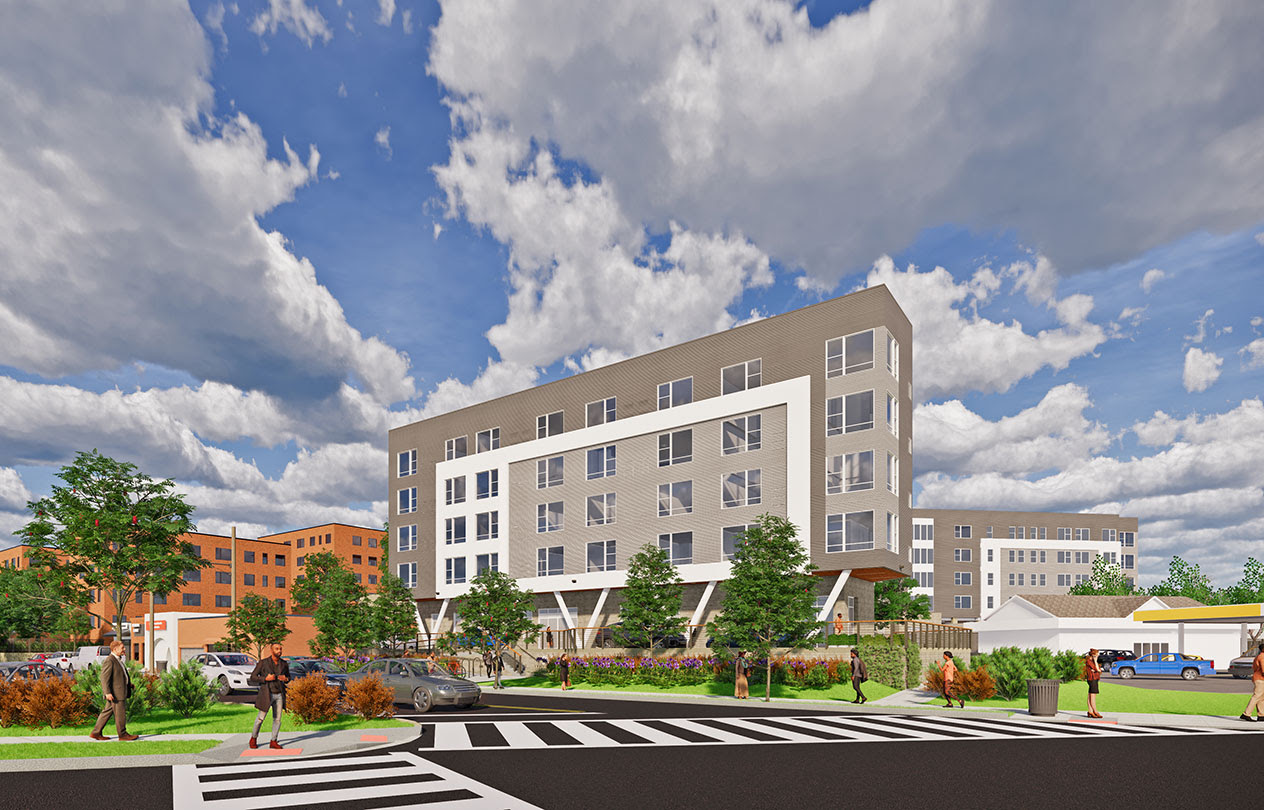Washington, D.C., Nov. 22, 2019 – Mayor Muriel Bowser, the District of Columbia Housing Finance Agency (DCHFA), and the project development team comprised of Gilbane Development Company, Dantes Partners, Carding Group, and H Street Community Development Corporation (HSCDC) celebrated the groundbreaking of Livingston Place at Southern, the first assisted living facility in Ward 8 and only the second with its services in the District. The five-story, 152-unit affordable community is reserved for seniors age 60 and above who require assistance with two or more activities of daily living. Residents of Livingston Place at Southern will receive meals, personal care services, and transportation services.
Apartments at Livingston Place at Southern will be reserved for individuals or couples with incomes of 60 percent or less of the annual median income and residents who qualify for Medicaid.
“We are excited to deliver the first affordable assisted-living facility to Ward 8, ensuring that seniors will be able to continue living in the community they love,” said Mayor Bowser.
FIRST AFFORDABLE ASSISTED HOUSING IN THE WARD
“The Gilbane Development Company/Dantes Partners team is thrilled to usher in the first affordable assisted housing in Ward 8 for our aging seniors,” said Buwa Binitie of Dantes Partners, joint venture developer for the project.
DCHFA issued $50 million in bond financing and underwrote $15.3 million in low-income housing tax credit (LIHTC) equity for the construction of Livingston Place at Southern, a $67 million development that will consist of 84 efficiency and 68 one-bedroom apartments. “Livingston Place at Southern is a unique development that will provide assisted living services to senior citizens that are capable of living independently yet need help with daily care," said Todd A. Lee, Executive Director and CEO, DCHFA. "The property will provide an option for District seniors to be able to age in place in an affordable community with support services onsite."
The property management company will be licensed by the DC Department of Health to operate the development as an assisted living facility. Staffing at the property will consist of an executive director and medical staff, including a full-time Director of Nursing, Licensed Practical Nurses eight hours a day, and certified nurse’s aides and trained medication employees on duty 24 hours a day.
All tenants will have access to support services including medical, dental, rehabilitative, and counseling services; assistance with activities of daily living, including eating, bathing, toileting, grooming, dressing and mobility, and 24‐hour supervision to ensure resident safety. Eleven percent of the apartments are designed to be fully accessible. All units throughout the building will feature accessibility measures such as lower kitchen countertops, spacious bathrooms with grab bars and an emergency call system. The development will feature common amenities such as a club/community room, dining rooms, library, theater/TV center, fitness/wellness center, beauty/barber salon and transportation for off-site activities.
ABOUT DC HOUSING FINANCE AGENCY AND GILBANE DEVELOPMENT
The District of Columbia Housing Finance Agency is in its 40th year of serving Washington, D.C.’s residents. The Agency’s mission is to advance the District of Columbia’s housing priorities; the Agency invests in affordable housing and neighborhood development, which provides pathways for DC residents to transform their lives. We accomplish our mission by delivering the most efficient and effective sources of capital available in the market to finance rental housing and to create homeownership opportunities.
Gilbane Development Company is the project development, financing and ownership arm of Gilbane, Inc., a private holding company in its fifth generation of family ownership and management. Gilbane Development Company provides a full slate of real estate development and project management services. Completed projects incorporate every aspect of real estate including: affordable housing, student housing, multifamily and single-family residential communities, mixed-use developments, corporate headquarters, healthcare facilities, operational | data | distribution centers, R&D | manufacturing facilities, and many types of facilities delivered through public-private partnerships. To learn more, visit www.gilbaneco.com/development
Related Stories
Urban Planning | Jun 15, 2023
Arizona limits housing projects in Phoenix area over groundwater supply concerns
Arizona will no longer grant certifications for new residential developments in Phoenix, it’s largest city, due to concerns over groundwater supply. The announcement indicates that the Phoenix area, currently the nation’s fastest-growing region in terms of population growth, will not be able to sustain its rapid growth because of limited freshwater resources.
Multifamily Housing | Jun 15, 2023
Alliance of Pittsburgh building owners slashes carbon emissions by 45%
The Pittsburgh 2030 District, an alliance of property owners in the Pittsburgh area, says that it has reduced carbon emissions by 44.8% below baseline. Begun in 2012 under the guidance of the Green Building Alliance (GBA), the Pittsburgh 2030 District encompasses more than 86 million sf of space within 556 buildings.
Industry Research | Jun 15, 2023
Exurbs and emerging suburbs having fastest population growth, says Cushman & Wakefield
Recently released county and metro-level population growth data by the U.S. Census Bureau shows that the fastest growing areas are found in exurbs and emerging suburbs.
Engineers | Jun 14, 2023
The high cost of low maintenance
Walter P Moore’s Javier Balma, PhD, PE, SE, and Webb Wright, PE, identify the primary causes of engineering failures, define proactive versus reactive maintenance, recognize the reasons for deferred maintenance, and identify the financial and safety risks related to deferred maintenance.
Mixed-Use | Jun 12, 2023
Goettsch Partners completes its largest China project to date: a mixed-used, five-tower complex
Chicago-based global architecture firm Goettsch Partners (GP) recently announced the completion of its largest project in China to date: the China Resources Qianhai Center, a mixed-use complex in the Qianhai district of Shenzhen. Developed by CR Land, the project includes five towers totaling almost 472,000 square meters (4.6 million sf).
Mixed-Use | Jun 6, 2023
Public-private partnerships crucial to central business district revitalization
Central Business Districts are under pressure to keep themselves relevant as they face competition from new, vibrant mixed-use neighborhoods emerging across the world’s largest cities.
Multifamily Housing | Jun 6, 2023
Minnesota expected to adopt building code that would cut energy use by 80%
Minnesota Gov. Tim Walz is expected to soon sign a bill that would change the state’s commercial building code so that new structures would use 80% less energy when compared to a 2004 baseline standard. The legislation aims for full implementation of the new code by 2036.
Student Housing | Jun 5, 2023
The power of student engagement: How on-campus student housing can increase enrollment
Studies have confirmed that students are more likely to graduate when they live on campus, particularly when the on-campus experience encourages student learning and engagement, writes Design Collaborative's Nathan Woods, AIA.
Multifamily Housing | Jun 1, 2023
Income-based electric bills spark debate on whether they would harm or hurt EV and heat pump adoption
Starting in 2024, the electric bills of most Californians could be based not only on how much power they use, but also on how much money they make. Those who have higher incomes would pay more; those with lower incomes would see their electric bills decline - a concept known as income-based electric bills.
Multifamily Housing | May 30, 2023
Boston’s new stretch code requires new multifamily structures to meet Passive House building requirements
Phius certifications are expected to become more common as states and cities boost green building standards. The City of Boston recently adopted Massachusetts’s so-called opt-in building code, a set of sustainability standards that goes beyond the standard state code.

















